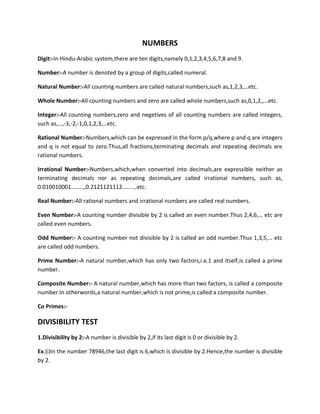
Numbers
- 1. NUMBERS Digit:-In Hindu-Arabic system,there are ten digits,namely 0,1,2,3,4,5,6,7,8 and 9. Number:-A number is denoted by a group of digits,called numeral. Natural Number:-All counting numbers are called natural numbers,such as,1,2,3,…etc. Whole Number:-All counting numbers and zero are called whole numbers,such as,0,1,2,,…etc. Integer:-All counting numbers,zero and negetives of all counting numbers are called integers, such as,…,-3,-2,-1,0,1,2,3,…etc. Rational Number:-Numbers,which can be expressed in the form p/q,where p and q are integers and q is not equal to zero.Thus,all fractions,terminating decimals and repeating decimals are rational numbers. Irrational Number:-Numbers,which,when converted into decimals,are expressible neither as terminating decimals nor as repeating decimals,are called irrational numbers, such as, 0.010010001………,0.2121121112………,etc. Real Number:-All rational numbers and irrational numbers are called real numbers. Even Number:-A counting number divisible by 2 is called an even number.Thus 2,4,6,… etc are called even numbers. Odd Number:- A counting number not divisible by 2 is called an odd number.Thus 1,3,5,… etc are called odd numbers. Prime Number:-A natural number,which has only two factors,i.e.1 and itself,is called a prime number. Composite Number:- A natural number,which has more than two factors, is called a composite number.In otherwords,a natural number,which is not prime,is called a composite number. Co Primes:- DIVISIBILITY TEST 1.Divisibility by 2:-A number is divisible by 2,if its last digit is 0 or divisible by 2. Ex.(i)In the number 78946,the last digit is 6,which is divisible by 2.Hence,the number is divisible by 2.
- 2. (ii)In the number 78945,the last digit is 5,which is not divisible by 2.Hence,the number is not divisible by 2. 2.Divisibility by 3:-A number is divisible by 3,if the sum of its digits is divisible by 3. Ex.(i)In the number 78945,the sum of digits is 7+8+9+4+5=33,which is divisible by 3.Hence,the number is divisible by 3. (ii)In the number 78946,the sum of digits is 7+8+9+4+6=34,which is not divisible by 3.Hence,the number is not divisible by 3. 3.Divisibility by 4:- A number is divisible by 4,if the number formed by its last two digits is 00 or divisible by 4. Ex.(i)In the number 65248,the number formed by last two digits is 48,which is divisible by 4. Hence,the number is divisible by 4. (ii)In the number 65249,the number formed by last two digits is 49,which is not divisible by 4. Hence,the number is not divisible by 4. 4.Divisibility by 5:- A number is divisible by 5,if its last digit is 0 or 5. Ex.(i)In the number 39875,the last digit is 5 and in the number 24560,the last number is 0. Hence,both the numbers are divisible by 5. (ii)In the number 39874,the last digit is 4. Hence,the number is not divisible by 5. 5.Divisibility by 6:- A number is divisible by 6,if the number is divisible by both 2 and 3. Ex.(i)The number 74358 is divisible by both 2 and 3.Hence,the number is divisible by 6. (ii)The number 74362 is divisible by 2,but not divisible by 3.Hence,the number is not divisible by 6.Similarly,the number 74361 is divisible by 3,but not divisible by 2,Hence,the number is not divisible by 6. 6.Divisibility by 8:- A number is divisible by 8,if the number formed by its last three digits is divisible by 8. Ex.(i)In the number 961328,the number formed by last three digits is 328,which is divisible by 8. Hence,the number is divisible by 8. (ii)In the number 961327,the number formed by last two digits is 327,which is not divisible by 8. Hence,the number is not divisible by 8.
- 3. 7.Divisibility by 9:-A number is divisible by 9,if the sum of its digits is divisible by 9. Ex.(i)In the number 78912,the sum of digits is 7+8+9+1+2=27,which is divisible by 9.Hence,the number is divisible by 9. (ii)In the number 78913,the sum of digits is 7+8+9+1+3=28,which is not divisible by 9.Hence,the number is not divisible by 9. 8.Divisibility by 10:- A number is divisible by 10,if its last digit is 0. Ex.(i)In the number 39870,the last digit is 0. Hence,the number is divisible by 10. (ii)In the number 39874,the last digit is 4. Hence,the number is not divisible by 10. 9.Divisibility by 11:- A number is divisible by 11,if the difference between the sum of its digits at odd places and even places is either 0 or divisible by 11. Ex.(i)In the number 38694315,(Sum of digits at odd places) – (Sum of digits at even places) =(5+3+9+8) – (1+4+6+3)=25-14=11,which is divisible by 11.Hence,the number is divisible by 11. (ii)In the number 38694317,(Sum of digits at odd places) – (Sum of digits at even places) =(7+3+9+8) – (1+4+6+3)=27-14=13,which is not divisible by 11.Hence,the number is not divisible by 11. 10.Divisibility by 12:- A number is divisible by 12,if the number is divisible by both 3 and 4. Ex.(i)The number 74388 is divisible by both 3 and 4.Hence,the number is divisible by 12. (ii)The number 74385 is divisible by 3,but not divisible by 4.Hence,the number is not divisible by 12.Similarly,the number 74288 is divisible by 4,but not divisible by 3,Hence,the number is not divisible by 12. IMPORTANT FORMULAE
